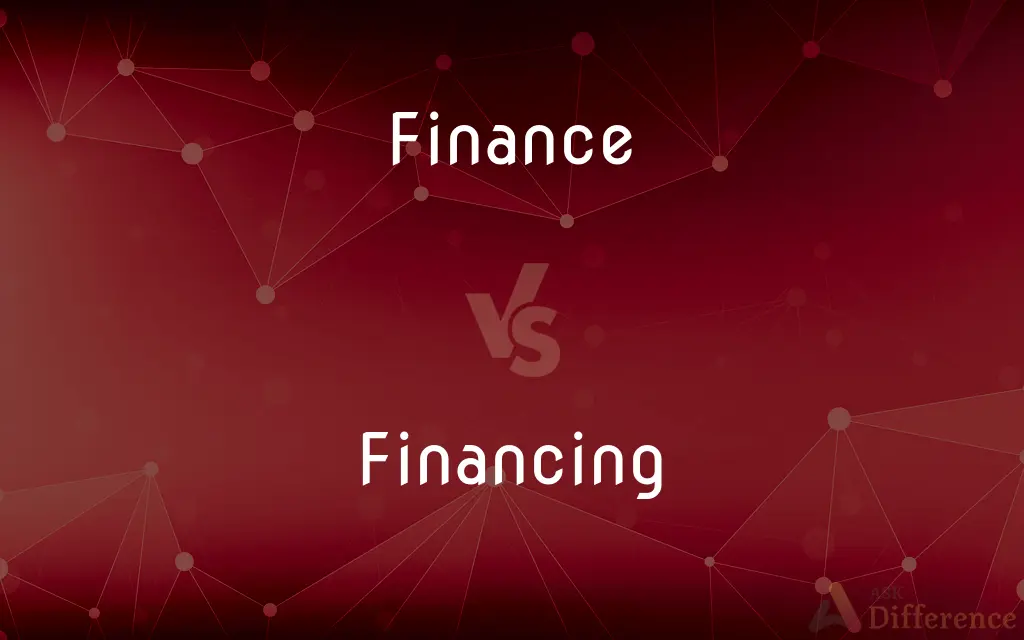Finance vs. Financing — What's the Difference?
Edited by Tayyaba Rehman — By Fiza Rafique — Updated on March 29, 2024
Finance involves the management of money, including investing, borrowing, lending, budgeting, and saving. Financing refers specifically to providing funds for business activities, purchases, or investments.

Difference Between Finance and Financing
Table of Contents
ADVERTISEMENT
Key Differences
Finance encompasses a broad spectrum of activities related to the management of money and other valuable assets. It includes the processes of investing, lending, borrowing, budgeting, saving, and forecasting. Finance operates on multiple levels, from personal finance to corporate finance and public finance, each with its own set of principles, strategies, and objectives. On the other hand, financing is a more focused term that refers specifically to the act of providing funds for business activities, making purchases, or investing. Financing is often sought for specific projects, acquisitions, or the expansion of operations, and can come from various sources, including loans, equity investments, and grants.
Finance is concerned with the allocation of assets and liabilities over time under conditions of different degrees of uncertainty and risk. It involves creating and managing wealth efficiently and effectively, making strategic decisions that maximize an entity's economic value. Whereas financing is a subset of finance that deals directly with raising capital or funds to support an entity's needs. This could involve securing loans from financial institutions, attracting equity investors, or issuing bonds to the public.
The principles and theories of finance apply broadly across different sectors and inform decisions about investment, capital allocation, risk management, and financial planning. Finance uses a variety of tools and models, including discounted cash flow analysis, risk management techniques, and portfolio theory, to make informed decisions. On the other hand, financing techniques and strategies are primarily concerned with the practical aspects of raising funds, such as choosing the right mix of debt and equity, determining the optimal capital structure, and managing the costs of financing.
In the context of personal finance, the distinction becomes clearer. Personal finance involves budgeting, saving, investing, and planning for the future, encompassing a wide range of financial activities aimed at building wealth, securing financial well-being, and planning for retirement. Financing, within personal finance, could refer to specific actions like taking out a mortgage for a home, obtaining a car loan, or using credit cards for purchases. These are targeted actions aimed at fulfilling immediate or short-term financial needs through external sources of funds.
On a corporate level, finance is integral to strategic planning, involving the assessment of investments, managing assets and liabilities, optimizing capital structure, and ensuring the long-term profitability and sustainability of the business. Financing, in this context, involves specific activities to secure the capital necessary for these strategic initiatives. This could include issuing new shares, taking on debt, or securing lines of credit. Financing decisions are directly influenced by the broader goals and strategies set forth by the discipline of finance.
ADVERTISEMENT
Comparison Chart
Definition
The management of money, including investing, borrowing, saving, and budgeting.
The act of providing funds for business activities or investments.
Scope
Broad, covering all aspects of managing money and assets.
Narrower, focused on the acquisition of funds.
Key Activities
Investing, saving, budgeting, forecasting.
Securing loans, attracting investors, issuing bonds.
Application
Personal, corporate, and public finance.
Specific projects, acquisitions, or operational expansion.
Objective
To manage wealth efficiently and make strategic decisions maximizing economic value.
To raise capital to support financial needs or goals.
Compare with Definitions
Finance
The science of managing money and assets.
She studied finance in college to learn how to manage investments.
Financing
The process of securing funds for a specific purpose.
They sought financing for their new startup venture.
Finance
The process of planning, directing, and controlling financial resources.
Good finance management is crucial for a company's growth.
Financing
The act of providing funds for business activities.
The government program was crucial in financing small businesses.
Finance
Analyzing financial data to forecast future trends.
Finance professionals often use historical data to predict market movements.
Financing
Obtaining funds to support operational needs.
Financing was necessary to maintain the company's cash flow during the downturn.
Finance
The act of making strategic investment decisions.
Their finance team decided to diversify the investment portfolio.
Financing
Raising capital through loans or equity.
Financing their expansion involved taking a significant loan from the bank.
Finance
Budgeting for future financial needs and goals.
Personal finance involves creating a budget to save for retirement.
Financing
Securing investment for a project or purchase.
They managed to secure financing for their home renovation.
Finance
Finance is a term for matters regarding the management, creation, and study of money and investments. Specifically, it deals with the questions of how an individual, company or government acquires money – called capital in the context of a business – and how they spend or invest that money.
Financing
The act of providing or raising funds or capital.
Finance
The management of money, banking, investments, and credit.
Financing
Funds or capital provided by investors or lenders.
Finance
Finances Monetary resources
Could not make the purchase because of limited finances.
Financing
Present participle of finance
Finance
The supplying of funds or capital.
Financing
A transaction that provides funds for a business.
The successive equity financings were at higher and higher valuations.
Finance
To provide or raise the funds or capital for
Financed a new car.
Financing
The act of financing
Finance
To supply funds to
Financing a daughter through law school.
Finance
The management of money and other assets.
Finance
The science of management of money and other assets.
Finance
Monetary resources, especially those of a public entity or a company.
Who's really in charge of a democracy's finances?
Finance
The provision of a loan, payment instalment terms, or similar arrangement, to enable a customer to purchase an item without paying the full amount straight away.
Finance on all our new cars is provided by ABC Loans Ltd.
Finance
(intransitive) To conduct, or procure money for, financial operations; manage finances.
Finance
To pay ransom.
Finance
(transitive) To manage financially; be financier for; provide or obtain funding for a transaction or undertaking.
His parents financed his college education.
He financed his home purchase through a local credit union.
Finance
To extort ransom from.
Finance
The income of a ruler or of a state; revenue; public money; sometimes, the income of an individual; often used in the plural for funds; available money; resources.
All the finances or revenues of the imperial crown.
Finance
The science of raising and expending the public revenue.
Finance
To conduct the finances of; to provide for, and manage, the capital for; to financier.
Securing foreign capital to finance multitudinous undertakings.
Finance
The commercial activity of providing funds and capital
Finance
The branch of economics that studies the management of money and other assets
Finance
The management of money and credit and banking and investments
Finance
Obtain or provide money for;
Can we finance the addition to our home?
Finance
Sell or provide on credit
Common Curiosities
Is taking out a mortgage considered finance or financing?
Taking out a mortgage is considered an act of financing, as it involves securing funds for the specific purpose of purchasing a home.
What is finance?
Finance is the management of money and includes activities like investing, borrowing, lending, saving, and planning.
Can financing affect a company’s financial health?
Yes, financing decisions directly impact a company's financial health, affecting its debt levels, interest costs, and overall financial flexibility.
How do finance and financing differ in their application?
Finance has a broad application, covering personal, corporate, and public finance, while financing is specifically about raising funds for particular needs or goals.
What role does finance play in economic development?
Finance plays a critical role in economic development by allocating resources efficiently, supporting investments, and facilitating trade and commerce.
Can individuals seek financing, or is it just for businesses?
Individuals can seek financing for personal needs, such as education, home purchases, or starting a personal business.
How does finance help in personal wealth management?
Finance helps in personal wealth management by providing strategies and tools for budgeting, saving, investing, and planning for future financial needs.
Why is financing important for startups?
Financing is crucial for startups as it provides the necessary capital to fund operations, drive growth, and scale the business.
What does financing mean?
Financing refers to the act of providing funds for business activities, purchases, or investments.
How does the cost of financing affect business decisions?
The cost of financing influences business decisions by affecting profitability, investment viability, and the overall cost of capital.
Share Your Discovery

Previous Comparison
Merchant vs. Retailer
Next Comparison
Behind vs. AfterAuthor Spotlight
Written by
Fiza RafiqueFiza Rafique is a skilled content writer at AskDifference.com, where she meticulously refines and enhances written pieces. Drawing from her vast editorial expertise, Fiza ensures clarity, accuracy, and precision in every article. Passionate about language, she continually seeks to elevate the quality of content for readers worldwide.
Edited by
Tayyaba RehmanTayyaba Rehman is a distinguished writer, currently serving as a primary contributor to askdifference.com. As a researcher in semantics and etymology, Tayyaba's passion for the complexity of languages and their distinctions has found a perfect home on the platform. Tayyaba delves into the intricacies of language, distinguishing between commonly confused words and phrases, thereby providing clarity for readers worldwide.
















































